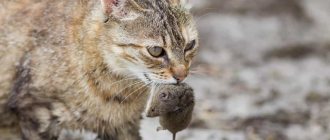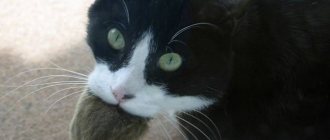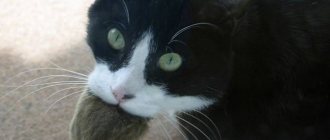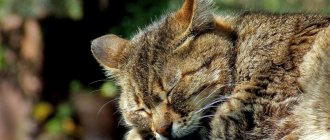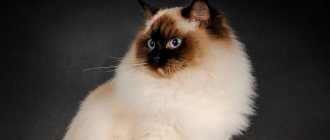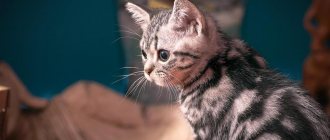When it comes to catching mice, no innovative device can compare with a smart house cat. Fluffy pets have won the love of humans thanks to their ability to destroy rodents. Today, breeders keep cats for the hobby, so pets usually lead a passive lifestyle. For people living in rural areas and having a subsidiary farm, it is important that the cat knows how to catch mice and rats. Rodents periodically appear in every country house and are capable of destroying food and causing diseases. Which cats are better at catching mice, and which breeds are not suitable for hunting?
The role of living conditions
The hunting instinct is present in cats, regardless of variety and gender. To test your skill, you need to scratch your finger across the floor and observe the pet’s behavior. The faster the animal reacts to the sound, the stronger the hunting instinct is. If the cat immediately rushes to the hand, it will be good at catching mice.
Pets living in an apartment and not walking in the yard can catch a mouse, but they will not kill or eat the pest. Animals with the appropriate instinct feed on mice, which can only be taught to a kitten by a mother mousetrap. Animals that grew up in villages or on the street are better at catching rodents, because from childhood they know what a mouse is and how to behave with it. For outdoor cats, hunting is the main way of obtaining food.
Are male or female cats better mousecatchers?
It is widely believed that the most effective mousecatchers are unspayed female cats. Female cats are proud and caring mothers. Most queens teach their kits to hunt at an early age. This keeps the instinct sharp and alert.
Males are still effective hunters. Tomcats that have not been neutered have a lot of energy and potential aggression. This energy needs to be directed somewhere. Mice can become the target of unwanted attention.
If you're looking for a cat to play as a mouser, seriously consider a female. If you don't plan to breed the cat, get a queen who has already given birth to at least one litter. She is most likely to cope with your invasion.
The importance of a pet's appearance
Success in catching rodents depends on the conditions in which the kitten grew up and the appearance of the animal. Color plays a significant role, serving as natural camouflage. The most preferred are discreet fur coat colors: gray, black, brown. A cat with a motley or tortoiseshell color will blend into the surrounding landscape. The second significant point is the length of the coat. When wet, the long fur acquires a specific odor, which serves as a signal for rodents that a predator is approaching. Therefore, short-haired cats find it easier to hunt in the rain.
IT IS IMPORTANT TO KNOW! When choosing a ratcatcher kitten, you need to pay attention to the whiskers . Thanks to the vibrissae, the pet navigates in the dark, picks up air vibrations, and estimates the distance to the mouse.
Catchers of rodents among cat breeds
Rat catchers are not listed in the breed registries of felinological organizations. Everyday experience shows that most often rat-catching cats are found among the following breeds:
- the Kurilian Bobtail is a brave hunter, capable of repelling attacks not only from rats, but also from dogs, an excellent swimmer, and easy to train;
- Russian Blue - a favorite of sailors, a thunderstorm of “super rats” reaching 500 grams, an opponent to bask on the owner’s lap; obstinate towards “stranger partners” (but gets along well with rat-catching cats of her own breed);
- Siberian - an unpretentious and silent virtuoso hunter, distinguished by sharp bladed teeth and huge heavy paws;
- Kimrskaya - a frisky short-tailed beauty, distinguished by a heightened hunting instinct, amazing dexterity, speed of reactions, excellent health;
- the European Shorthair is a faithful defender of barns, ready to pursue prey even in a state of satiety;
- The Maine Coon is the largest rodent catcher, combining strength, agility and beauty.
The photos will help you evaluate the “fighting qualities” of rat-catching cats of the named breeds. Furry hunters differ in character and attitude towards their owners - they can be affectionate or unsociable. What unites them is their breeding under natural conditions, and not through artificial selection.
Useful materials:
- Tricolor cat breed History of tricolor The mysterious origin of tricolor cats has not been sufficiently studied. What is certain is the fact that...
- Cat breed brindle Wool and colors Today the brindle color is commonly called “tabby”. It covers the entire body of the animal with stripes, like...
- The cat looks in the mirror Why can't cats look in the mirror? There are many beliefs and signs associated with cats, legends and...
- Cat breed Likoy LikoyLikoy Media files on Wikimedia CommonsLikoy is a breed of cat that arose as a result of a natural mutation in the fur of a domestic short-haired cat.…
This cute, fluffy, affectionate creature is a natural enemy of field mice, house mice, and rats. Pests cannot even stand the smell of cats; they avoid their property and fear for their lives.
In cats, the huntress instinct is genetically embedded. Even when well-fed, she will not miss the moment to chase a mouse that suddenly appears. The process itself gives pleasure - to catch, not to miss. But whether to kill, eat or not depends on other factors.
Interesting!
By what signs can you recognize a rat catcher?
A mousetrap cat is not a breed, but a rare skill that a pet develops due to the conditions of its keeping and upbringing. The best hunters are considered to be mongrel cats, who have had to hunt mice for food since childhood. Street animals are not spoiled by the attention and care of the owner, so the hunting instinct develops and is preserved for a maximum period.
The following signs will help you recognize a future rat catcher in a kitten:
- if one of the parents is good at catching mice, by four months the skill will be transferred to the kitten;
- female. Cats catch mice better than cats, which is associated with increased activity and fearlessness. To feed her offspring, the mother cat will get food in any way, so her hunting instinct is heightened;
- head shape. Animals with a triangular oriental skull shape have greater potential for catching rats;
- activity in the game. If a kitten runs after ribbons, toy mice and catches them with his teeth, he will make a good hunter;
- physiological characteristics. The pet must be well built, have developed muscles, strong bones;
- high ears with tassels. Allow the pet to track rustles and squeaks, which increases the likelihood of finding a target;
- color feature. It is believed that the best hunters are tri-colored, tortoiseshell, and motley cats.
The character and content of mestizos
As practice and description show, mestizos are very diverse.
Some, for a number of specific reasons, may appear from breeders in luxury nurseries, some are born at home from parents of different species. In this case, you can certainly determine the breed of the parents, and it will be easier to determine the character and disposition of a mestizo kitten. As a rule, they inherit some character traits from their father, and some from their mother, and a mestizo may first receive the character trait that is most dominant in their parents. The character of an animal primarily depends on the living conditions in which the pet is located. If the baby was born at home, where all conditions are created for him, he is surrounded by love and affection, then his character will be kind, even and flexible. If we are talking about conditions on the street, then in the struggle for survival and finding food, many soft character traits will be lost.
Metis who were born on the street must survive and get their own food, and will value the owner who gives them a home. Cat owners cannot come to one opinion about who is better - animals with a pedigree, or mestizos. Some believe that the breed is cool, while others believe that outbred cats have qualities that a cat with a breed does not have; they are more flexible, kinder, and have a better character.
Mixed breed animals have habits and character traits from both their mother and father. In order to provide such a pet with the necessary care, if possible, you need to know who its parents were and what is special about caring for this breed. Having all this information, you can easily choose a diet, adapt to your pet’s habits, and predict his desires.
Such a feline pet adapts much more easily to a new life in a new home and does not feel so sad during the owner’s absence. They can also easily get along with other inhabitants in the apartment. And their character is more loyal than that of the vindictive Siamese or the wayward British.
Like all felines, such a crossbreed also needs proper nutrition. The food should be healthy and balanced. This can be dry food, preferably of good quality. You need to determine what kind of animal you have. If the cat is neutered, then you need to feed him food for sterilized cats according to the age grid. If he is domestic and does not go outside, there is also a certain food for them
A cat can also eat homemade food, but you should pay attention to the fact that raw meat and fish should not be given. The diet should include cereals, vegetables, and eggs can be given a couple of times a week. You should not abuse dairy products, it is better if they are fermented milk
But in homemade food, unlike balanced dry food, the pet may lack vitamins and minerals; they can be added to food in the form of treats
You should not overuse dairy products; it is better if they are fermented milk. But in homemade food, unlike balanced dry food, your pet may lack vitamins and minerals; they can be added to food in the form of treats.
In principle, mestizos have good immunity and are not susceptible to various viral diseases and bacteria. The rules for caring for them are the same as for cats with a pedigree.
“A prerequisite is control by a veterinarian, annual vaccination, and necessary prophylaxis before it.”
As necessary, ears should be cleaned, nails trimmed, and water procedures performed. A healthy animal should be active and have a good appetite. If you notice that your pet is not the same as always, you urgently need to contact a specialist for examination.
Can neutered cats catch mice?
It is believed that spaying and castration does not affect the hunting skill of a pet. In practice, things are different. Such operations often have a negative impact on the animal’s behavior and physiological state. If you castrate a cat, the animal becomes lazy and passive, sleeps for a long time, not interested in what is happening around. Also, after castration, cats gain excess weight, which interferes with successful hunting. To ensure that the rat catcher does not lose his skills, after the operation the animal must be fed with suitable dietary food and stimulated to be active.
Ratcatcher cats for rent: where to find, cost
Buying a real rat catcher is quite difficult: you can be deceived for a lot of money. However, in some cities it is possible to rent a cat. You should know that ratcatcher cats are available for rent from breeders, many specialized nurseries, and animal and pet supply stores. After the rats are killed, the animal is returned.
For a cat, being in a new place with unfamiliar people can be stressful, so you cannot be sure that in such an environment he will catch rodents.
You can rent a ratcatcher cat
For this purpose, you can find a rat-catcher cat via the Internet, using message boards, for example, the site for finding part-time jobs YouDo, or specialized forums. There is no fixed price for such services; sometimes it is set depending on the cost of the cat itself. Typically, the price of such a service varies from 500 to 3 thousand rubles.
Forum participants generally have a negative attitude towards giving their animal to catch rats, since no one wants to create a stressful environment for the cat, and besides, this can be dangerous: the rats may already be poisoned.
Nutrition question
An animal that regularly hunts mice needs to be properly fed. The physical condition, strength, and endurance of the pet depend on the nutritional characteristics. Domestic cats rarely eat prey; more often they simply strangle the mouse. Only a street or hungry cat can eat a rodent.
The animal can be fed natural food or industrial feed. The main thing is that the pet eats suitable and healthy food that suppresses hunger, saturates the body with vitamins and minerals, and strengthens the animal’s immune system.
ON A NOTE! Most domestic cats catch mice for fun, but do not eat rodents.
Features of care and maintenance
A real rat catcher can be raised from a small kitten. You just need to use some tips:
- To maintain the hunting instinct, the animal should be given food in small portions at least 5-6 times a day. To prevent the cat from becoming lazy, it should not be overfed. Food should not be in the bowl all the time, but the cat should not be left hungry either, since the rat hunter will need strength to attack the rodents.
- It is necessary to cultivate a hunting sense in the future rat catcher, praise and encourage him for any prey he catches: a bird, a mouse, a fly.
- It is difficult for a person to raise a kitten to be a rodent hunter, and therefore there is no need to separate it from its mother cat for up to 5 months so that during this time she can teach him the necessary skills.
- The pet must lead an active lifestyle; it requires not only toys in the form of balls, mice, bows, but also special play complexes.
- Rat catchers need to be vaccinated against rabies to boost their immunity, since rats are aggressive animals. When cats receive wounds from rodents, the damaged areas must be carefully treated and consulted with a veterinarian.
Otherwise, the care and maintenance of rat catchers is no different from the care of ordinary cats.
Suitable breeds
The best mousecatchers are native cat breeds that appeared naturally and have not undergone significant transformation. Compared to artificially bred ones, hunting skills in such breeds have been developed over centuries, which has given the corresponding result.
Maine Coon
Maine Coon
Maine Coon cats are the best hunters of mice and rats. Maine Coons are distinguished by their large size and strength, which does not prevent them from gracefully jumping and chasing prey in hard-to-reach places. Maine Coons are gambling animals. A cat can chase a rat for hours, ignoring heat, cold, and rain. Thanks to its thick coat, the animal feels comfortable in the cold and can spend a long time outdoors. Large body sizes make it possible to destroy large rodents, which repel smaller rat catchers. Maine Coons prefer to spend time in the yard; country life is an ideal option for them.
Russian blue
Russian blue
Due to its compact size and aristocratic appearance, village house owners doubt the hunting skills of the Russian Blue cat. The lack of heavy weight is compensated by a quick reaction and the ability to move quietly around the yard. The Russian Blue cat tracks rodents of any size, which serves as the main entertainment for the pet. The cat's movements are graceful and precise, the speed of movement is amazing. The owners of Russian blue cats confirm that they hear any rustle and leave no chance for the mice to survive.
Which cats are the best mousecatchers?
Now we will look at the breeds of domestic cats that are considered the best mousecatchers. If you are looking for a rodent control cat, these breeds should be your priority.
American Shorthair
The American Shorthair originally arrived in the United States on the Mayflower. This decision was partly due to superstition. In the 18th century, people believed that cats protected ships from storms. More importantly, these cats are natural hunters. Sailors used them to keep rodent populations under control.
These cats are calm and docile around people, but are merciless when prey comes into their sight. The American Shorthair is a low-maintenance and independent breed. This is an ideal choice for the novice owner who needs a mouse catcher.
Burmanskaya
We already mentioned that many domestic cats do not eat mice. This does not apply to the Burmese breed, which is voracious. This cat will not hesitate to find a rodent population and eat to its fill.
The Burmese cat is also a loving and affectionate cat breed that enjoys human interaction. The Birman cat makes a great family pet and litter cat if you take the time to attend to its needs. Burmese cats will crave constant attention and entertainment.
Chartreuse
The Chartreux is a rare cat breed, especially in the United States. Therefore, such a pet will be very expensive from the breeder. This is a shame, because these cats are not just beautiful and loving. They are also skilled hunters.
Chartreux cats typically develop slowly, and it may take three years before this breed reaches full maturity. When this happens, the Chartreuse is a muscular, energetic cat that loves to chase prey. If you can find a Chartreuse, consider adding one to your family.
Japanese Bobtail
The Japanese Bobtail is not Japanese at all. These sociable cats come from Korea, where they were bred specifically to hunt mice. Korean silk factories often struggled with rodents until the Japanese bobtail appeared.
Intelligent and affectionate, Japanese Bobtail cats do best in a busy home with constant social interaction. They can also be a bit bossy, so think carefully before matching this cat with another breed. However, you will appreciate this dominance when it comes time to hunt.
Maine Coon
Like American Shorthairs, Maine Coons have lived in the United States since the Pilgrims. These gentle giants are much larger than most cats, but love human company. They're basically giant teddy bears, unless you're a mouse.
The Maine Coon's large, muscular frame ensures that it will make short work of any rodent that ventures into your home. For this reason, these cats are popular on farms. If you have a place for a Maine Coon in your home, you will have a friend for life.
If you are unlucky enough to suffer from rodent infestation and cat allergies, a Manx may be a possible solution. While no cat is truly hypoallergenic, this breed comes closest to that status.
Manx is a born hunter. Many farmers around the world rely on Mank cats to keep rodents away from their crops. The same approach can bear fruit in the home. Just know that Manx cats can be wary of strangers, and they need a calm home to thrive.
Persian
Persians have a reputation for being the laziest cat breed. To some extent this is true. You can often see your Persian pacing around the house, seemingly without a care in the world. Appearances can be deceiving. Persians are one of the most effective mousecatchers in the world.
Basically, the Persian cat will move if it has a good reason to do so. The chance to catch a mouse provides such motivation to the fullest. Your Persian cat will move like lightning if it spots an intruder and will return to snoozing on the couch as if nothing had happened.
Siamese
If you prefer a dog but need a cat to catch mice, a Siamese cat is the perfect compromise. These cats are playful, affectionate and noisy. Siamese cats also love to hunt. However, they need constant attention, so you should not get a Siamese cat if you are rarely at home.
Siberian
Don't be fooled by the bulky size of the Siberian cat. These cats may be large, but they are very agile. This dexterity will come in handy when hunting. Only the most determined mouse will escape the attention of a Siberian cat.
Siberian cats develop slowly, often acting like kittens until they are five years old. This is great for hunting, but will require a significant amount of time spent playing and managing risky behavior. Don't adopt a Siberian cat unless you're sure you can handle the responsibility.
Turkish Angora
Unlike most popular pet breeds, the Turkish Angora did not originate in captivity. Being domesticated, these cats trace their origins from nature, from the European country that bears their name.
This wild heritage makes the Turkish Angora an excellent hunter. The Turkish Angora will quickly become attached to humans, but will always give preference to the opportunity to catch live prey.
Other breeds
As a hunter for a private home, you can purchase the following breed of cats:
- European Shorthair. Smart, active and inquisitive pets, distinguished by courage and bravery. The European Shorthair cat adapts to any weather conditions and is distinguished by its affectionate behavior. In the fight against rodents, animals have proven themselves to be ruthless killers.
- European tabby. The color of the animal is similar to that of a tiger. Tabbies are distinguished by their strong structure and muscularity, have a strong, large head, sharp teeth and claws. The hunting instinct is inherent from birth, so they grow up to be excellent mousecatchers.
- Turkish Angora. Cats of this breed have snow-white fur and blue eyes. Despite its defenseless appearance, the Turkish Angora tends to live in the yard and lead an active life. Thanks to fearlessness and curiosity, the pet effectively catches mice.
Siberian cat
Representatives of the Siberian breed are distinguished by their willfulness. But this does not stop them from hunting rats in the area. They prefer to walk as often as possible, so cleaning the area from pests is guaranteed.
Siberian cats become quite large as they grow older. They run fast and jump far. The strongest part of their body is their paws, so rats caught in them will not be able to escape from captivity. Despite their success in hunting, Siberians have a character that is difficult to get along with.
How to teach a cat to catch mice?
Mousecatchers are found among purebred and outbred cats. In order not to make a mistake, it is recommended to figure out in advance what criteria to choose a kitten by. Attention is paid not to the physical structure, color or breed, but to the parents. If the father or mother is good at catching mice, they will teach the kitten the skill. Therefore, you should first ask the owners how good hunters the parents were. A reasonable option is to go to the nearest village to pick up the kitten. Animals growing outside chase flies, butterflies and other insects, which develops the hunting instinct.
It is difficult to teach a domestic cat to hunt; the instinct must be developed from childhood. The owner needs to purchase appropriate toys, lined with fur, and constantly tease the kitten so that he runs after them. You should develop your pet's agility, reaction speed, coordination and endurance. To attract your pet's attention, the toy can be soaked in a decoction of catnip. As an alternative, you can catch the mouse and show the rodent to your pet. The kitten will interest her. You can only remove a mouse when the animal has had enough of playing with the pest and strangled it.
FACT! To teach a domestic cat to hunt, many owners limit their diet, which serves as an incentive to catch mice.
Hunting instinct in cats
All representatives of the cat family are predators. This applies not only to tigers, lions and pumas, but also to cute pets. For the distant ancestors of modern cats, hunting rodents and small birds was the main way to get food for themselves and their cubs. Over the course of many centuries, the predatory habits of cats have been improved, and a hunting instinct has formed.
Hunting instinct
It is he who guides domestic or yard cats when they catch rats and mice. Of course, in pampered pets, provided with the best food, the hunting instinct has somewhat dulled, unlike cats living on the street and forced to get their own food, but still it is the hunting instinct that makes a small kitten catch a bow or run after a toy.
Recommendations
A hunting cat spends a lot of time outdoors, in contact with other animals, which increases the likelihood of infection and the development of diseases. To protect your pet from diseases, you need to remember the following rules:
- the cat must be periodically vaccinated against potential diseases;
- the pet needs to be fully fed and fortified with vitamin supplements, which will strengthen the immune system;
- every 5 months, clean your pet of worms for the purpose of prevention;
- the animal needs to buy a flea collar that prevents the spread of parasites;
- in early spring, before a walk, it is recommended to treat your pet’s fur with protective sprays, since in May the likelihood of insect attacks increases.
For preventative purposes, you can take your cat to the veterinarian for examination once every six months.
Maine Coon
Maine Coons are a very large breed, reaching up to 20 kg. They have strong muscles and also a death grip. Representatives of this breed are physically hardy, so they are unpretentious to their living conditions. Every day they need to give free rein to their activity.
Long walks are most often accompanied by hunting for various birds and land inhabitants. Overcoming a rat is not a problem for them. Since Maine Coons have a predatory nature, they will not tolerate affection from humans.
Heredity and upbringing
Numerous studies prove that a kitten's hunting abilities are influenced not only by heredity, but also by upbringing. If the baby had free access to prey, and his mother taught him to catch mice, then he will become a good hunter, regardless of breed or lack thereof. Of course, if you add to this the need to get your own food, your abilities will develop even better.
Good heredity
And yet heredity is very important in the formation of real mousecatchers. If all ancestors caught mice, then most likely this skill will pass on to kittens. But the most important role is played by the mother, she is the one who helps babies develop the hunting instinct, turning it into a skill. The mousetrap cat begins to train kittens from an early age, and they adopt all her experience by about 4-5 months. So before this age you should not take the baby away from its mother.
How to raise and teach a cat to catch mice?
The future mouse catcher's hunting skills need to be developed from early childhood. Usually the mother does this. It all starts with the cat catching a live mouse and bringing it to the kids. Later, the kittens begin to hunt on their own, first under the supervision of their mother, then alone.
But you can try to teach your kitten to catch mice yourself. To do this, use active games, special toys, or another effective option - walks, during which the kitten can catch frogs, beetles or butterflies. Every time the baby catches prey, he should be praised.
It is very important to remember that you cannot force a cat to catch mice by starving it. The animal will weaken, become lethargic and will no longer have the time to hunt. There is a high probability that the cat will begin to climb through garbage dumps in search of food. But it is important not to overfeed the cat so that he remains active.
Production
If a cat has the makings, and the training has borne fruit, then pretty soon you can see your pet eating its first mouse.
Why do cats bring caught mice to their owners?
An interesting point is that a cat does not always eat caught mice. For many mustachios, the hunting process is much more important and interesting, and they prefer to eat their usual food. Quite often, strangled or slightly chewed rodents end up on the windowsill, on the threshold, or even by the bed of their beloved owners. There are several explanations for the fact that the cat did not eat the mouse, but brought it to the person:
- Many cats perceive people as clumsy creatures who lack even the most necessary skills. By bringing us prey, the pet shows concern so that its human does not die of hunger.
- The cat is proud of itself, hopes for recognition and praise, or wants to please its owner.
- The animal stores food for the future and believes that food will be safer in the house.
In any case, the appearance of a dead mouse in the house should be taken calmly, and the cat should be praised and thanked. You can throw away a gift only when the pet does not see it, otherwise resentment on his part cannot be avoided.
Who is better at catching mice - a cat or a cat?
Both male and female cats catch and eat mice. But females are considered the best hunters. They have a more developed hunting instinct, while males are more focused on finding a partner and procreation. A cat needs to provide food not only for itself, but also for its offspring.
A fairly popular question is which cats are better at catching mice - neutered or not. Castration does not affect the hunting instinct in any way, but as practice shows, it often affects the animal’s lifestyle. The cat becomes lazy and avoids any active actions, which naturally negatively affects his hunting abilities. Interestingly, the habits of a sterilized female usually do not change.
